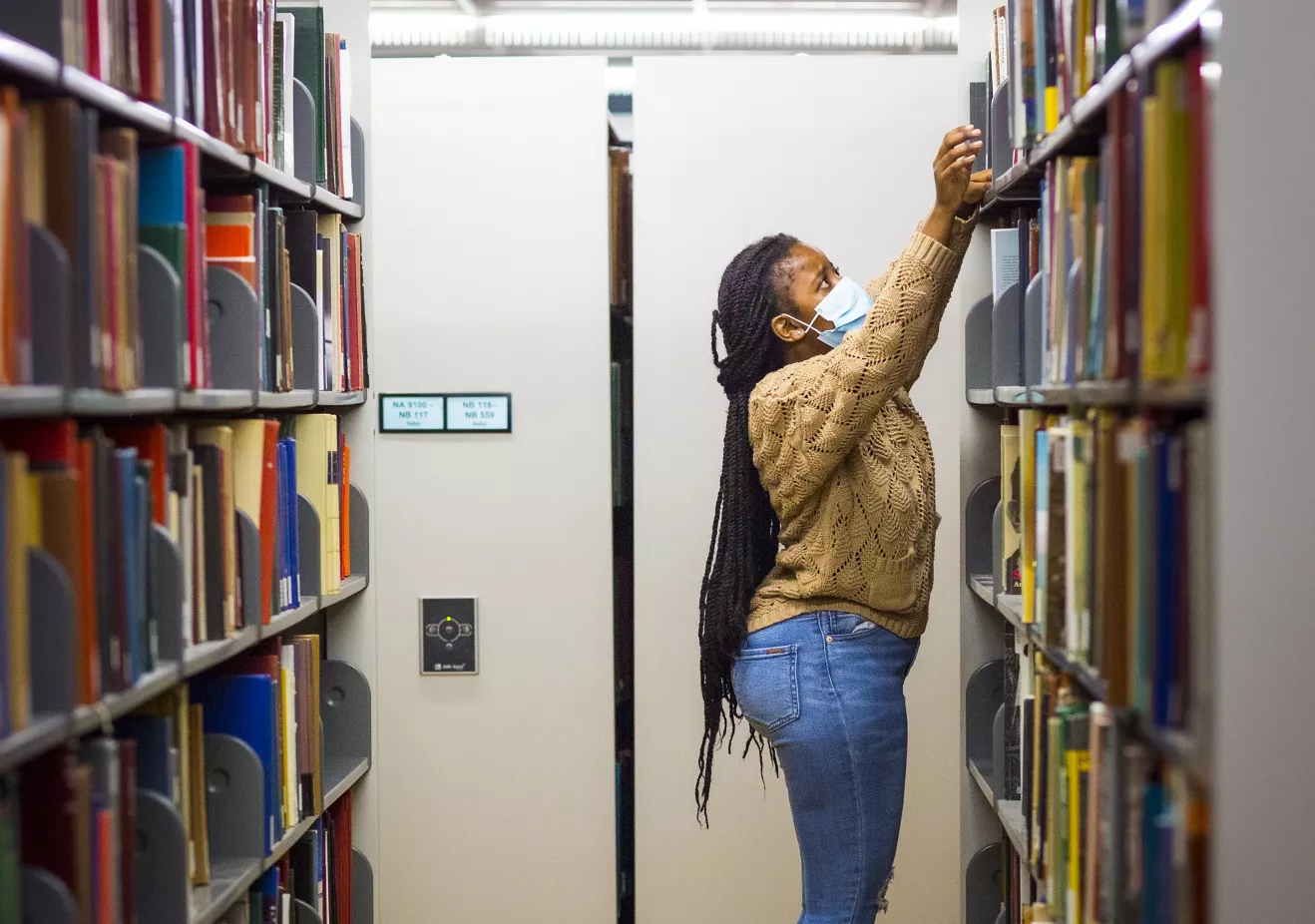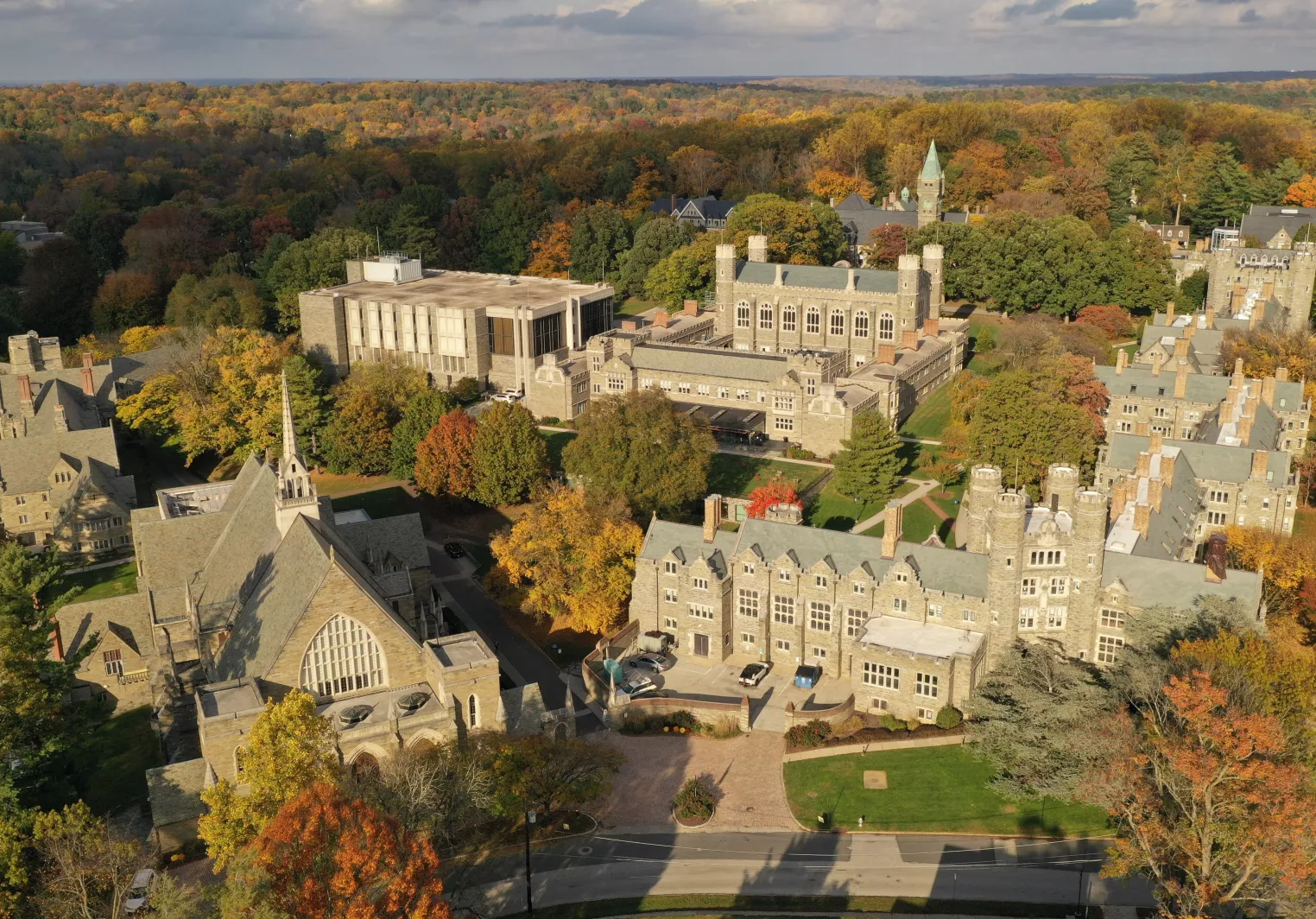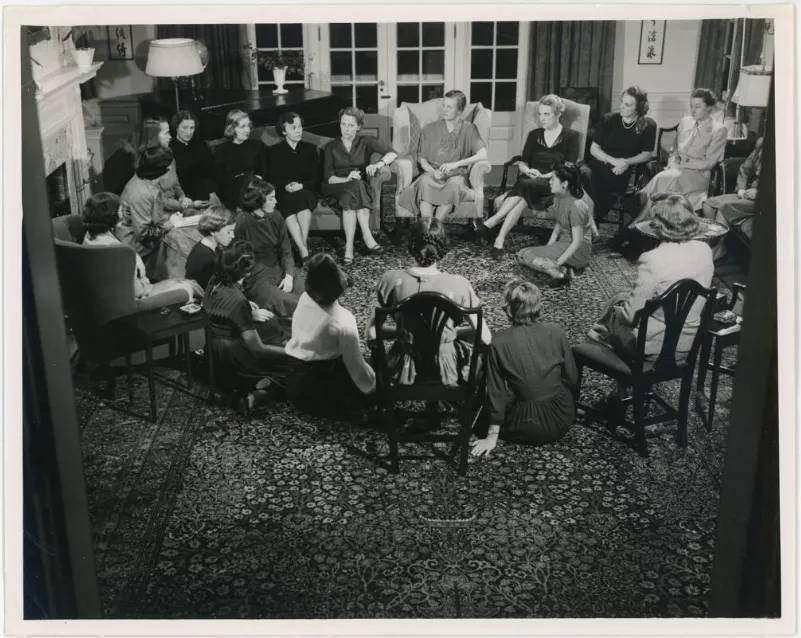
College History & Legacies
Established in 1885, Bryn Mawr was founded to offer a more rigorous education than any then available to women. Like many projects of late 19th-century Progressive thinkers, this bold vision embodied emancipatory potential and deep contradictions.
A Brief History of Bryn Mawr College
From its founding, Bryn Mawr has prized superb teaching and research. The College offered undergraduate and graduate degrees from the outset, and was the first women’s college to offer the Ph.D. Bryn Mawr’s undergraduate and graduate programs became widely viewed as models of academic excellence, helping to elevate higher education standards nationwide.
While the College has been non-denominational for most of its history, Bryn Mawr was founded by members of the Religious Society of Friends (“Quakers”). Its Quaker legacy can be traced in the costly, principled stands President Katherine McBride took on behalf of freedom of belief and conscience during the McCarthy era and again in the late 1950s and during the Vietnam War, at times costing the College government financial aid funds. The College’s commitment to social justice has also found myriad forms of expression on campus, including in the 1914 founding of its Graduate School of Social Work and Social Research, one of the first in the United States, and the deep engagement of many current students in community service and with social justice issues.
First Student Self-Government Association
Respect for students’ capacity to direct their own lives has always been an integral part of Bryn Mawr, which was the first college in the country to approve a student self-government association (1891). For more than 125 years, students have taken a large measure of responsibility for managing residential life and upholding standards of academic integrity through the College’s Honor Code, which many alumnae/i describe as a lifelong touchstone for professional and personal integrity.
The traditions of high expectations, academic excellence, civic engagement, and ethical commitment remain at the core of Bryn Mawr’s identity, expressed today through innovative academic programs and approaches to learning and among students and alumnae/i who pursue lives of purpose in all fields of endeavor.
Accomplished Graduates
Bryn Mawr graduates include Emily Balch 1889, who received the Nobel Peace Prize in 1946; Ume Tsuda 1894, founder of the first women’s college in Japan; Enid Cook ’31, a distinguished microbiologist and the first African American graduate of Bryn Mawr; seven recipients of MacArthur Fellowships; the first women presidents of the University of Chicago and Harvard University; recipients of Pulitzer Prizes; members of the National Academies of Science; one of Forbes Magazine’s ten most powerful women in the world; and many leaders in business, government, and nonprofit organizations.
Researching Bryn Mawr's History

College Archives
The Bryn Mawr College Archives holds many narratives of Bryn Mawr College, with an emphasis on its undergraduate life and alumnae/i. Encompassing more than 3 million items and over 2,000 linear feet, the collections in the College Archives document campus life and administrative decisions from 1885 to the present.

Researching College History
Some of the Bryn Mawr College Archives materials have been digitized and are available through the TriCollege Libraries Research Guides. Resources for archival research include the Bryn Mawr College Finding Aids and the TriCollege Libraries Digital Collections. Subject librarians are available to help with research.

Opportunities and Funding
Bryn Mawr community members can seek out funding for projects related to uncovering College histories, documenting historical events, and telling untold stories. Funding is available through the Center for Career and Civic Engagement and includes opportunities for research during the year and over the summer.
Research Opportunities
Bryn Mawr College has many formal and informal opportunities to engage in projects that explore our history.
On Campus Jobs and Fellowships
- Impact Center Fellowships & Opportunities
- Academic Year Employment in Special Collections
- Internships in Special Collections
- Digital Scholarship Summer Fellows Program
Courses
- HIST B268-001, Telling Bryn Mawr Histories: Topics, Sources, and Methods, Semester / 1, Lecture: 9:10 a.m.-12 p.m.,TH, Gallup-Diaz, I.
- HART B279-001, Exhibiting Africa: Art, Artifact and New Articulations, Semester / 1, Lecture: 1:10-4 p.m.,TH, Old Library 104, Scott, M.
- HART B316-001, Museum Studies Fieldwork Seminar, Semester / 1, Lecture: 2:10-4 p.m., W, Old Library 102, Scott,M.
- CITY B378, Formative Landscapes: The Architecture and Planning of American Collegiate Campuses
- Digital Bryn Mawr Seed Grants
- On campus jobs in Digital Scholarship
- On campus jobs in Special Collections
- Digital Bryn Mawr Seed Grants
- Design a Praxis experience or course
- Design a 360 course cluster
Reckoning and Repair Efforts
Bryn Mawr strives to build a welcoming community for all while we gain insights from our history. The following ongoing projects seek to create change where it is most needed.

